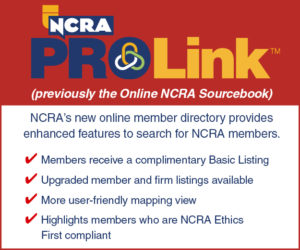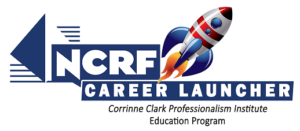By Annemarie Roketenetz
It’s not uncommon for new professionals in any field to face anxieties when starting out in their chosen career. This is especially true for those entering the court reporting and captioning professions, whether it’s a new internship or a new job.
But take heed, newbies. According to the pros, the three major concerns when starting a new position typically involve first impressions, working with others, and making a lasting, positive impression. And there are numerous ways to deal each of them.
According to Kevin Hunt, a freelance reporter and owner of Jack W. Hunt & Associates in Buffalo, N.Y., a first impression can make the difference between landing a job or being shown the door, regardless of how well someone writes. “When a reporter goes to a job, they’re representing the reporting firm as a whole, and if their clothes are inappropriate or they are not well-groomed, that’s probably not the image the firm wishes to present. That goes for not just the visual impression, but the auditory and olfactory impressions as well.”
NCRF Chair Jan Ballman, RMR, CMRS, owner of Paradigm Reporting & Captioning in Minneapolis, Minn., agrees that first impressions are instant. “Whether it’s fair or unfair, we are judged based on how we appear and whether we have our act together. You should be mistaken for counsel, not the witness,” she said. “If you come screeching through the conference room door for a deposition stressed out, in a huff, in a sweat, or otherwise agitated — whether because of traffic, or your GPS sent you on a wild goose chase, or your infant spit up on your shoulder just as you were leaving, or you had to turn back for your power cords — be assured of two things: First, counsel won’t care why you’re late; and, you’ve just started the day in a deficit when it comes to making a good impression.”
Ballman also stresses that the best and easiest way to create a good first impression is to look great, not average and not just good. “Look like you made an effort and that you belong in a room filled with highly educated professionals,” she advises.
In addition to looking professional, acting professional is also important in making a first positive impression. “I feel the most important part of making a good impression is arriving early, being friendly, having a good attitude, and being organized,” says Shelly Hunter, RPR, CRR, owner of Hunter & Geist, Denver, Colo. “As we all know, depositions are often stressful environments. Having someone in the room that is neutral to all parties and that can remain friendly in the midst of chaos can be a game changer. If a deposition is not going so well for a client, the last thing they want is a court reporter with a bad attitude.”
Don’t let your good impression down once you have established it. According to the pros, be sure to take the time to know the firm you plan to work with and understand its culture both in terms of employment and services offered.
In addition, be sure the work you produce is of high quality in terms of accuracy, readability, and usability. Hunt advises having a conversation with the transcript when proofreading. “The ultimate consumer of your service will not know how beautifully you wrote when they were speaking at 300 words per minute, they won’t know how skillfully you navigated the software used to translate, edit, and print the transcript; they will only make a determination of your skill as a reporter through the final presentation of the transcript. What are the attorneys and witness trying to verbally describe? If you don’t understand something, ask. In brief, if you want to know how your clients will judge you, remember this phrase: ‘It’s the transcript, dummy!’”
To help ensure an accurate transcript, new reporters should also not be afraid to interrupt the person who is speaking if they cannot understand what is being said. “I stress to my reporters that you must interrupt and you cannot rely on your audio sync,” says Hunter. “I stress that it is the reporter’s job to interrupt and get a good record.”
Ballman agrees. “As with anything else in life, it’s all about phraseology, phraseology, phraseology. If you can’t hear, you have no choice but to interrupt. It’s all about how you interrupt,” she says. “Think about how you would like to be interrupted if you were deep in thought and delivering a very important point in front of an audience, then practice doing that so it comes naturally when you have to interrupt attorneys in mid-sentence or mid-thought.”
According to the pros, maintaining lasting good impressions also takes work, and new reporters should make it a habit to keep positive attitudes both on and off the job, be helpful to others, and learn to be unflappable in the face of all things in the world of court reporting. “It’s not just a matter of doing a great job once and then being recognized for it; it’s a matter of doing an impeccable job consistently, over and over and over again,” says Ballman. “That’s how you set yourself apart.”
Hunter also advises that new reporters make it a habit to arrive early at jobs to ensure enough time to address any issues that might arise. “You may have forgotten something in your car. You may have trouble with your equipment. You may have gone to the wrong location. Being early allows you extra time to deal with situations that happen to all of us. You have extra time to add entries to your dictionary from the notice or the caption. Arriving early also allows you time to get acquainted with counsels who might have arrived early, as well. And most importantly, as a new reporter, arriving early will give you time to calm your nerves. There is a confidence attorneys have when they know the court reporter is set up ready to go and it is still 20 or 25 minutes before the deposition is to begin,” she says.
“New situations constantly arise, and as a professional court reporter, it is necessary for each of us to be aware of the guidelines that NCRA provides to assist us in acting ethically and professionally,” Friend continues. “While these guidelines from the Committee on Professional Ethics cannot envision every possible situation, they give a framework for all reporters – whether new or seasoned – on how to act appropriately, professionally, and without favoritism to any party in a case,” Friend advises.New professionals also need to ready for any situation that might arise and remain calm. One way is to be prepared, says Doug Friend, RDR, CRR, with Beouvich, Walter & Friend, Portland, Ore.: “Working as a new reporter can be stressful! Here you are on a deposition or in court, and there is no one to hold your hand, so it’s important to be prepared.
NCRA’s Code of Professional Ethics can be found at NCRA.org/CodeofProfessionalEthics.
Annemarie Roketenetz is NCRA’s Assistant Director of Communications. She can be reached at pr@ncra.org.
| Developed in coordination with the Corrinne Clark Professionalism Institute
The Corrinne Clark Professionalism Institute, NCRF’s newest initiative, officially launched at the 2015 NCRA Convention & Expo. It was developed to educate court reporting students and new professionals about professionalism, branding, and building a successful career. NCRF will be developing materials, such as seminars and articles, for dissemination for court reporting students and new professionals throughout their careers. The Corrinne Clark Professionalism Institute was created to honor Clark’s lifelong passion for journalism and education, as well as her love of the court reporting profession. Corrinne Clark is the wife of Robert H. Clark, for whom the NCRF library is named. |






















